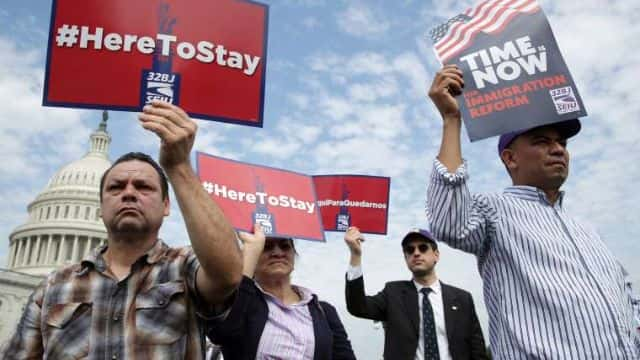A Temporary Protected Status (TPS) designation allows immigrants from specific countries to remain in the United States until they can safely return home.
Under current immigration law, the U.S. secretary of homeland security is authorized to designate a country for TPS if it meets certain conditions that temporarily prevent its nationals from safely returning home or if it is unable to handle the return of its nationals adequately.
The secretary may designate a country for TPS due to an ongoing armed conflict, such as civil war; an environmental disaster, such as an earthquake or a hurricane; or other extraordinary, temporary conditions.
Those who apply for and are granted TPS receive a stay of deportation as well as the opportunity to apply for a work permit.
Individuals who are already in the United States at the time of TPS designation or redesignation are protected. Afghanistan, Burma, Cameroon, El Salvador, Haiti, Honduras, Nepal, Nicaragua, Somalia, South Sudan, Sudan, Syria, Ukraine, Venezuela, and Yemen had TPS designations as of June 2022.
The Federal Register notices for the two most recent designations, Ukraine and Cameroon, were published in April and June 2022, respectively. TPS would have protected an estimated 354,625 immigrants as of February 2022.
TPS Holders’ Ties To The United States

Most TPS holders have been in the United States for a long time; the two largest groups of TPS holders, Hondurans and Salvadorans, include immigrants who have been in the country since 1998 and 2001, respectively.
Nearly 500,000 U.S. citizens, including 279,000 children under the age of 18, live with a TPS holder in their family.
Furthermore, TPS holders contribute significantly to the US economy, working in industries ranging from construction to child care.
TPS holders and their households pay $2.3 billion in federal taxes and $1.3 billion in state and local taxes each year, and they have more than $10.1 billion in spending power.
Read more:-
- Turbotax, Intuit Inc., Has Reached an Agreement With Tennessee
- US Inflation Hits 41-year High: What Does It Mean for the Indian Economy and Market?
- Commentary: Witness by Witness, the Truth of the January 6th Capitol Attack Revealed
Individuals who are already in the United States at the time of TPS designation or redesignation are protected.
Afghanistan, Burma, Cameroon, El Salvador, Haiti, Honduras, Nepal, Nicaragua, Somalia, South Sudan, Sudan, Syria, Ukraine, Venezuela, and Yemen had TPS designations as of June 2022.
The Federal Register notices for the two most recent designations, Ukraine and Cameroon, were published in April and June 2022, respectively. TPS would have protected an estimated 354,625 immigrants as of February 2022.
Most TPS holders have been in the United States for a long time; the two largest groups of TPS holders, Hondurans and Salvadorans, include immigrants who have been in the country since 1998 and 2001, respectively.
Nearly 500,000 U.S. citizens, including 279,000 children under the age of 18, live with a TPS holder in their family.
Furthermore, TPS holders contribute significantly to the US economy, working in industries ranging from construction to child care.
TPS holders and their households pay $2.3 billion in federal taxes and $1.3 billion in state and local taxes each year, and they have more than $10.1 billion in spending power.


